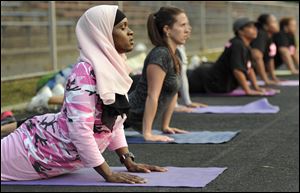
U.S. Muslims face long, hot days of Ramadan
7/30/2011
Personal trainer Mubarakah Ibrahim, left, works with clients in her early morning boot camp class in New Haven, Conn. Because of the fasting, she rearranged her schedule during Ramadan, to mostly mornings, when she has the most energy.
MIAMI — The Muslim holy month of Ramadan, which begins Monday, falls during the long, hot days of August this year, and Muslim Americans are getting ready to adjust their schedules and eating habits to accommodate the daylight fasts the holy days require.
It can be even tougher for Muslims in America than for their counterparts in majority-Muslim countries, where business slows down during Ramadan and people take it easier during the day, says Dr. Elizabeth Rourke, an internist at Boston Medical Center.
“In the U.S., everyone is required to do what they would do ordinarily, the entire month,” Dr. Rourke says, “so it makes the fast much more demanding for American Muslims.”
Mubarakah Ibrahim, a personal trainer, hopes to cram all her clients in the morning when she has the most energy. She’ll serve vegetables as the first course when her family breaks their fast in the evenings to make sure they get their nutrients for the day. And she’ll buy her four kids — ranging in age from 10 to17 — shiny new water bottles as a reminder to hydrate during the hours they’re not fasting.
“We know spirituality can get you through anything,” says Ms. Ibrahim, who lives in New Haven, Conn. “But the choice really is, you can suffer through it and still do it, or you can do it and do it efficiently without making your health suffer.”
Ramadan requires daily fasts of food and water during daytime hours. Typically observers eat a meal before dawn and break their fast at sunset.
The fast-breaking meal — which varies by ethnic group but traditionally starts with a handful of sweet dates — is seen by many Muslims as an opportunity to gather with family and friends.
When Ramadan begins Monday, the period from dawn to sunset in the continental United States can range from around 14 to around 16 hours, depending where one lives.
The Islamic calendar follows the lunar cycle, which is shorter than the sun-based Gregorian calendar, so the holy month creeps up on the calendar 11 days every year. Ramadan can last 29 or 30 days, again depending on the lunar cycle.
Fasting during Ramadan is one of the most important duties in Islam, one that even the not-so-religious typically observe.
Children are not required to fast until they hit puberty, though many start building up to it when they’re younger with half-day fasts.
Also exempt are the elderly, women who are pregnant or nursing, and people with chronic medical conditions.
But even for healthy Muslims, the daily fast from dawn until sunset can be grueling.
Dr. Rourke teaches medical residents about Ramadan and its implications for patients — how to adjust medication regimens to fit the daytime fast when possible, how to advise patients on avoiding dehydration, how to enlist help from a local religious leader if someone who shouldn’t be fasting expresses the intention to do so.